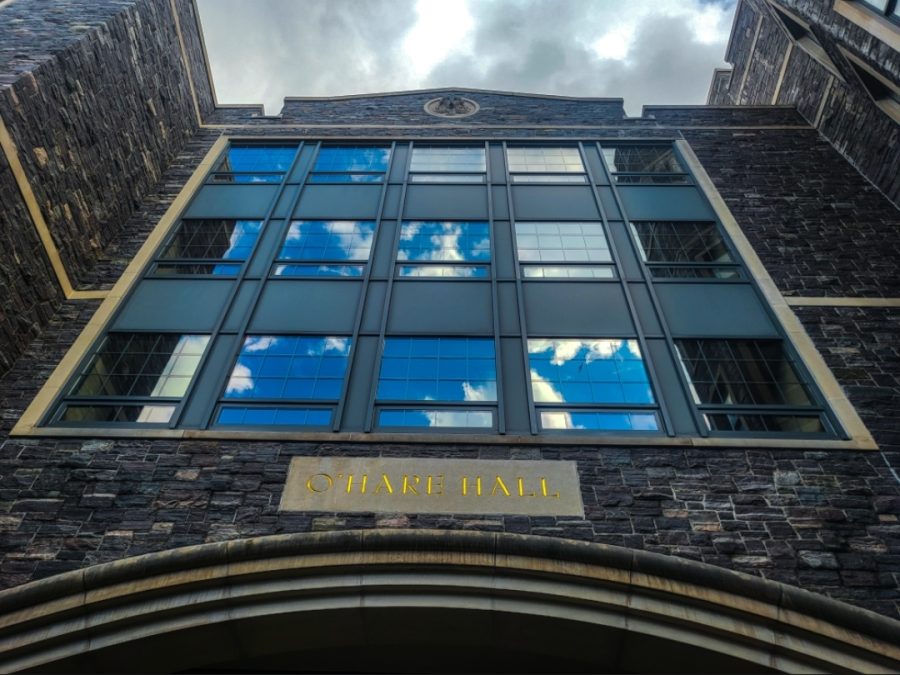The Boland Hall Fire: A Lesson Unlearned
Numerous false fire alarms have occurred at O’Hare Hall between this semester and the last, according to residents. If Fordham University administration wants to protect its residents and do all it can to prevent avoidable tragedies, it must fix the issues surrounding the false fire alarms before a real fire breaks out.
Boland Hall is a freshman residential dormitory at Seton Hall University housing more than 600 students. On Jan. 19, 2000, two intoxicated students living in Boland Hall wanted to play a prank on their fellow residents by forcing them to go out into the 20-degree weather. The two students set fire to a paper banner in a third-floor lounge at 4:30 a.m. in order to trigger the fire alarm.
The fire rapidly spread from the banner to the rest of the lounge and soon spread throughout the third floor. Several issues delayed students’ evacuation and the fire department’s response. The building had a poorly maintained fire hose system and did not have sprinklers. Notably, the residence hall had experienced several years of false fire alarms, causing students to casually ignore the alarms. These false alarms resulted in a tragic outcome that night, with the fire killing three students and injuring approximately 60 others.
Many universities have learned from the lessons of the Boland Hall fire in the 22 years since the tragedy. Sprinklers and other fire prevention and suppression systems have been installed throughout the nation, but fires still happen and tragedies still occur.
On Jan. 9, 2022, a fire started in a Bronx apartment building only a mile away from Fordham University. Malfunctioning fire safety systems caused the fire to spread far beyond where it should have been contained and repeated false fire alarms caused residents to ignore the alarm when there was a real emergency. One resident said that the fire alarms had previously gone off five or six times a day.
If we want to ensure that Fordham has the best fire safety system possible, we must examine past incidents and take steps to avoid repeating the same fatal mistakes. A common throughline in these two incidents and many others is false fire alarms. When fire alarms unnecessarily go off many times in a short time span, residents quickly begin to ignore them, no longer wanting to leave their room and go outside for half an hour in the middle of the night when there is no danger. This is a classic example of the boy who cried wolf, a story we all learned when we were children.
Isabella Salvucci, FCRH ’24, a resident of O’Hare last semester, told me she stopped counting how many false alarms there were after they reached 12. Several students reported that alarms usually went off at night, with residents recalling particularly unpleasant memories during a week of important exams when an alarm went off around midnight and then again at 1 a.m., affecting students’ sleep and study schedules. Many residents stopped leaving their rooms at a certain point, either too tired to leave or assuming that there was no danger.
There are two main reasons why these fire alarms have been falsely going off: Urban Kitchen sensor issues and O’Hare system errors. Some residents were told that Public Safety had moved sensors in Urban Kitchen that would occasionally set off an alarm when Urban Kitchen was cleaned. Sure enough, the first alarm of the school year was set off by Urban Kitchen.
One issue students took with Fordham’s fire safety protocols is a lack of communication. When fire alarms go off, residents are not told why, or what is being done to solve the issue. Resident Assistants (RAs) are sometimes told why alarms go off, but residents are often left in the dark. Residents are also worried about the lack of response from the New York City Fire Department (FDNY) this semester. Residents who lived in the building last year claimed to have seen the fire department come to almost every fire alarm, but this year residents have said they have not seen the fire department come once.
As residents grapple with issues throughout the building, be it mold, damaged and moldy laundry machines, out-of-order elevators or frequent false fire alarms, it is easy to adopt a defeatist attitude and assume that there is nothing we can do to get issues solved.
“I’m disappointed. It’s a shame to know, with all of Fordham’s funds and endowments alongside still rising tuition, the buildings are getting worse and worse, and work orders go missing and are ignored all the time,” says O’Hare resident Madhumita Madan, FCRH ’25.
It is important that RAs and residents let administration, facilities and public safety know what the issues are. One person’s complaint can be ignored; 100 people’s complaints become an issue that must be addressed.
If Fordham wants to protect their students from fires, the administration must improve its fire safety systems and protocols as soon as it can. Students must be informed about issues in their building and the reason for alarms, whether real or false. If Public Safety is blocking alarms from going directly to the FDNY to prevent city fines for too many false alarms, they must solve the issue at hand and find a way to prevent these false alarms so the fire department is not delayed in case of a real fire. Fordham must learn from past tragedies and stop these false alarms before a tragedy occurs.
“I know it can be repetitive,” says O’Hare RA Hajir Likaj, GSB ’23. “I know it can be inconvenient to come out at these hours, but it is important to continue to act as if these alarms are real and exit the building in case there is a true emergency.”si
Adam Lemoine, GSB ’24, is a business administration major and political science and economics minor from White Plains, N.Y.













































































































































































































